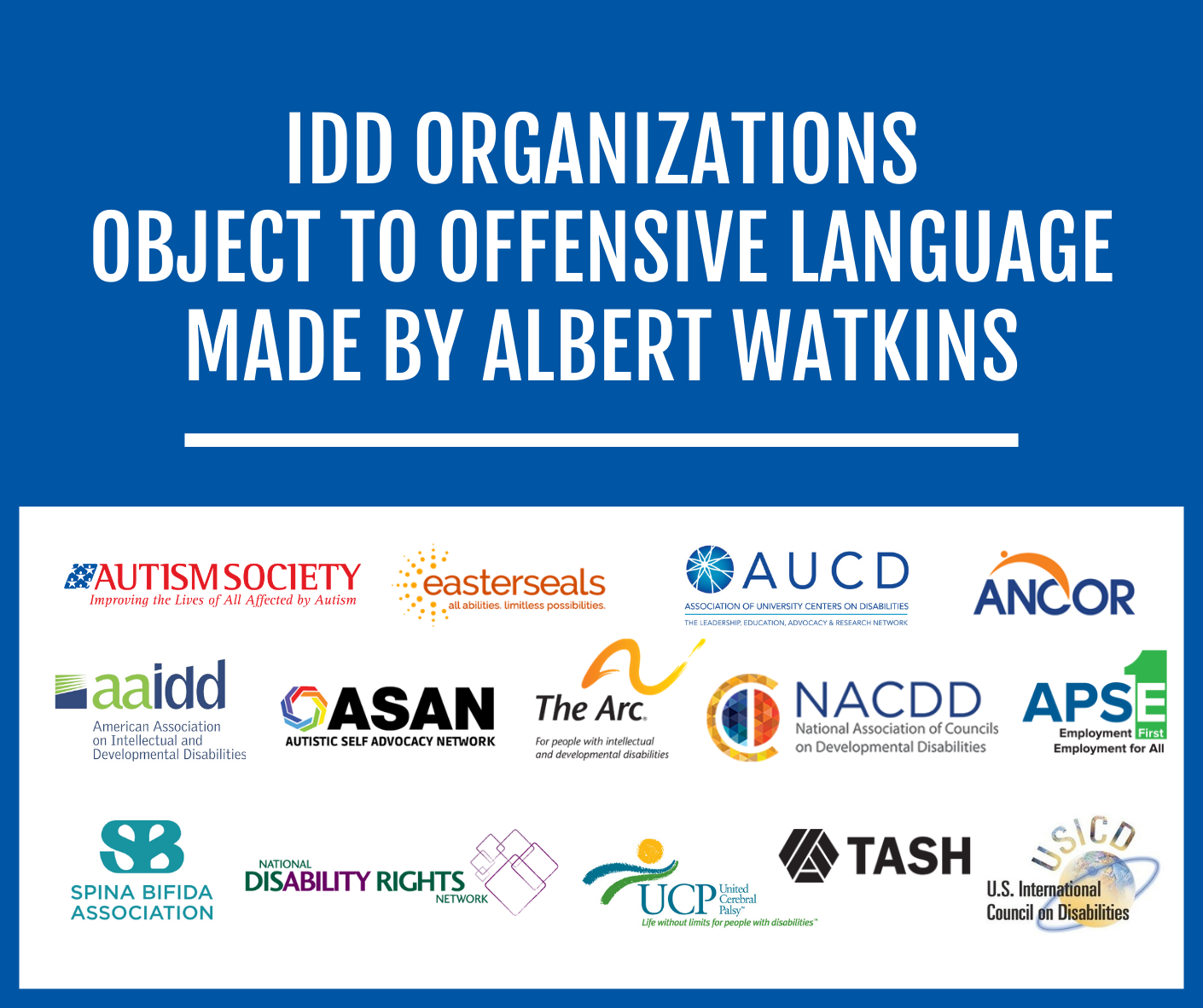May 21, 2021 [Washington, DC]
Intellectual and Developmental Disabilities Organizations Leaders Object to Offensive Language Made by Albert Watkins
Autism and Other Developmental Disabilities Are Not Linked to Violence or Likelihood to Commit Crimes
As leaders of intellectual and developmental disabilities organizations, we find recent statements made by Albert Watkins regarding our communities as reprehensible, inexcusable, and deeply offensive.
Albert Watkins, an attorney representing Jacob Chansley, one of the rioters of the Capitol on January 6, 2021, recently suggested that Mr. Chansley has Asperger’s syndrome, which is an older term that is no longer used as it’s part of the diagnosis for Autism Spectrum Disorder. He stated that this diagnosis and other contributing factors will be a part of Mr. Chansley’s defense.
While making his argument, Mr. Watkins stated, “A lot of these defendants—and I’m going to use this colloquial term, perhaps disrespectfully—but they’re all f__king short-bus people. These are people with brain damage, they’re f__king ret__ed, they’re on the g__damn spectrum.”
This language is unacceptable and the suggestion that having autism or other developmental disabilities is a defense to a crime cannot be tolerated. As a graduate of St. Louis University and having received his law degree from Georgetown Law School, Mr. Watkins knows the power of words and the harm caused by such offensive and unnecessary language.
His offensive and derogatory language contributes to the stigma that people with autism and other developmental disabilities experience. People with developmental disabilities are not more likely to commit crimes, nor is their disability a defense when they do offend. In fact, people with disabilities are much more likely to be victims of violence and abuse than they are to be criminals.
Our collective organizations have worked for years for and with people with disabilities and their families to promote a fully inclusive society. History tells us that comments like these, left unchecked lead to further discrimination and violence directed at people with intellectual and developmental disabilities.
Attempting to link people with intellectual and developmental disabilities to hateful or violent crimes furthers harmful stigmas. People with disabilities can hold their own opinions, and/or make bad choices, but this is because they are human, not because of their disability.
How we portray people with disabilities matters. The ADA National Network has a Fact Sheet that provides “guidelines for portraying individuals with disabilities in a respectful and balanced way by using language that is accurate, neutral and objective.” We urge those who are writing or speaking on disabilities to read this useful resource.
We call upon the public to join us in condemning the remarks of Mr. Watkins and promoting the development of a just society that treats all people with respect and dignity, including people with disabilities.
Organizations:
American Association on Intellectual and Developmental Disabilities,
Margaret A. Nygren, Executive Director & CEO
American Network of Community Options and Resources,
Barbara Merrill, CEO
Association of University Centers on Disabilities,
John Tschida, Executive Director
Association of People Supporting Employment First,
Julie Christensen, Director of Policy & Advocacy, Interim Executive Director
Autism Society of America,
Christopher Banks, President & CEO
Autistic Self Advocacy Network,
Julia Bascom, Executive Director
Easterseals,
Angela F. Williams, President & CEO
National Association of Councils on Developmental Disabilities,
Donna Meltzer, CEO
National Disability Rights Network,
Curt Decker, Executive Director
Spina Bifida Association,
Sara Struwe, President & CEO
TASH,
Mike Brogioli, Executive Director
The Arc,
Peter Berns, CEO
United Cerebral Palsy,
Armando A. Contreras, President & CEO
U.S. International Council on Disabilities,
Isabel Hodge, Executive Director
